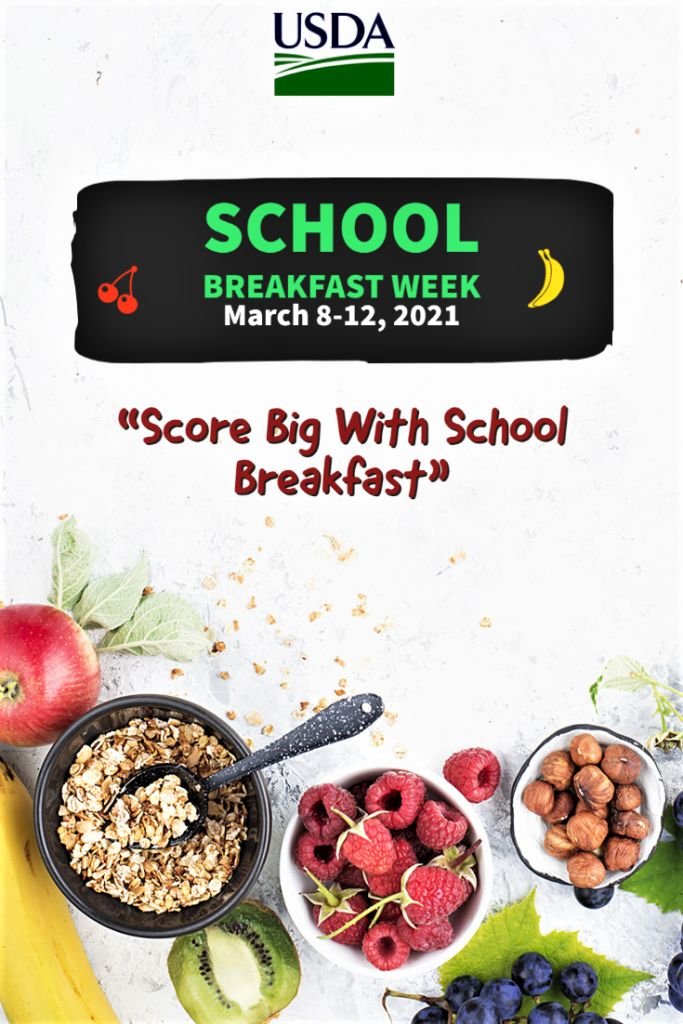USDA Food and Nutrition Service’s Southeast Region Recognizes National School Breakfast Week
ATLANTA, GA (March 9, 2021) — The Southeast Regional Office of the U.S. Department of Agriculture (USDA) Food and Nutrition Service (FNS) celebrates School Breakfast Week (March 8-12) highlighting the importance of school breakfast, and its value in improving children’s health and education outcomes – especially during these challenging times.
According to the USDA – Food and Nutrition Service Southeast Regional Office, in FY2020, the North Carolina Department of Public Instruction had 2,528 schools that operated the School Breakfast Program. Those schools had a total enrollment of 1,514,553 students and approximately 20% of them participated in the SBP each day.
“I am pleased to know that during the pandemic, schools have found innovative ways to serve breakfast, including the opportunity for parents to pick up meals from schools for their children who are learning from home,” said FNS Southeast Regional Administrator Willie C. Taylor. “We are grateful to our child nutrition partners, who since the very beginning have remained dedicated to feeding the children in their care as we all navigate this unprecedented time; their efforts have helped ensure every child in need has access to nutritious meals.”

The Southeast region (Alabama, Florida, Georgia, Kentucky, Mississippi, North Carolina, South Carolina and Tennessee) serves school breakfast to 3.2 million children every school day. According to studies, children who eat breakfast have improved moods and increased alertness throughout the morning. On average, students who participate in the School Breakfast Program (SBP) eat a breakfast of higher nutritional quality than students who eat breakfast elsewhere.
Schools and institutions that choose to participate in the SBP must serve breakfasts that meet the federal nutrition requirements and offer them at a free or reduced price to all eligible children. In exchange, participating institutions receive cash subsidies from USDA for each reimbursable meal served.
President Biden has taken executive actions to deliver economic relief for American families and businesses amid the COVID-19 crisis while addressing the racial inequities it has exacerbated.
“During the COVID-19 pandemic, the power of partnership between USDA’s Food and Nutrition Service and the heroes in our nation’s schools and lunchrooms has provided healthy meals to fight hunger, improve nutrition, and give students the best opportunity to focus and learn,” said Stacy Dean, Deputy Under Secretary for Food, Nutrition and Consumer Services. “FNS continues to innovate during these difficult times and will provide schools with the tools they need to keep serving healthy school meals no matter the challenge.”

SBP started in 1966 as a pilot project and was made a permanent program by Congress in 1975. The program provides reimbursement to states to operate nonprofit breakfast programs in schools and residential childcare institutions. FNS administers the program at the federal level. State education agencies administer the program at the state level, and local school food authorities operate the program in area schools.
USDA is extending free meals, including breakfast and lunch, for all children through its summer meal programs throughout the entire 2020-2021 school year. Schools may continue to use the summer meal programs to provide meal service to children through June 30, 2021.
USDA is continuing to provide program operators with support, resources, and flexibilities so they can ensure the children in their care are well-nourished and able to learn, even in new and ever-changing learning environments. These flexibilities – offered across the National School Lunch Program, School Breakfast Program, and Child and Adult Care Food Program – include:
- Allowing meals to be served outside of the typically required group setting.
- Allowing parent/guardian pick-up of meals.
- Waiving meal patterns when necessary.
- Allowing meals to be served outside of standard mealtimes; and
- Waiving the requirement that high school students be offered a variety of options to choose from for the reimbursable meal, which would be difficult in “grab n’ go” or situations where meals are served in the classroom.
The SBP is operated by public or nonprofit private schools at the high school level or below. Public or nonprofit private residential childcare institutions and charter schools may also participate in SBP as public schools.
